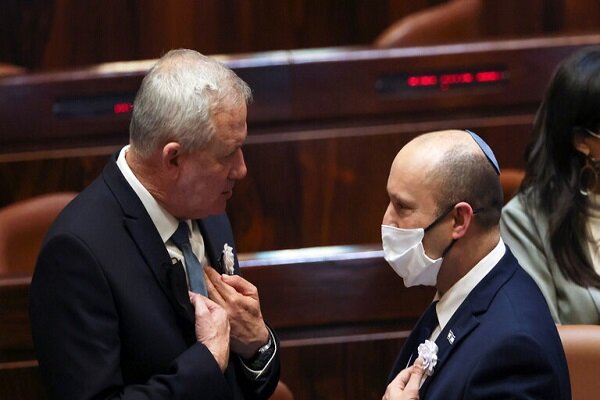Crisis inside Yaminah Party
Yaminah is a new rightist party which began its activity in 2019 under the leadership of Naftali Bennett. It is more right-wing in most respects than Likud; including in the field of making politics religious and also the issue of the annexation of the West Bank to the Zionist regime and the Zionist settlements in this region. Nevertheless, since Bennett became the Prime Minister of the Zionist regime, he has shown a very different political behavior than before and has become a politician from the middle wing. The composition of the cabinet also severely strained the prime minister due to the presence of the center-left and the left. About a year after the transfer of power in the Zionist regime, some members of this party were dissatisfied with the situation due to the adjustment of Bennett’s right-wing view. Another aggravating factor was Amikhai Shilki, a member of the party who joined the opposition when the cabinet was formed and opposed the principle of cooperation with the Arab party Raam.
Resignation of the head of the coalition wing
In early May 2022, Aidit Silman, who chaired the Coalition for the Inner Knesset, resigned from the coalition and joined Amikha Shilki as a result of a dispute with the Minister of Health over the consumption of unleavened bread in hospitals. The move reduced the number of pro-cabinet MPs to 60, removing the cabinet from a majority in parliament.
At the same time, the Likud party, which saw the first project as a success, began to put pressure on other members of the Yaminah party.
Apart from Silman, the other three Yaminah delegates were also relatively dissatisfied with the situation, and at the head of all of them was Nier Auerbach, the head of the Knesset secretariat. In a statement, Auerbach made his cooperation with the cabinet conditional on the implementation of some right-wing policies, including the development of Zionist settlements in the West Bank.
The Arab suspension!
The second side of the crisis was formed by the suspension of the cooperation of the Arab party of Raam with the cabinet. The party’s leader, Mansour Abbas, has announced that he will suspend his cooperation with the cabinet for two weeks following clashes between Jews and Muslims in Al-Aqsa Mosque and violence by Israeli police and soldiers. Following this action, the number of cabinet supporters in the Zionist regime’s parliament was reduced to 56. In this situation, Benjamin Netanyahu, the leader of the opposition, found the right ground to start the process of dissolving the cabinet.
According to the Rules of Procedure of the Knesset, such a request must first be put to a vote within the Secretariat, and if it is approved by the present majority or an absolute majority of the delegates, it can be voted on in the Knesset. Last week, the opposition twice voted on the bill in the secretariat, but both failed; But continued differences between the Raam party and the cabinet left Netanyahu still hopeful.
Finally, on May 10, while the opposition was to vote on the bill again within the Knesset secretariat, the announcement of Mansour Abbas’s support for the cabinet poured cold water on the body of the opposition. As a result, the bill was withdrawn and the crisis was temporarily contained.
In the last month, almost all the news has been bad for the Zionist regime’s cabinet, except that the situation of Amikhai Shilki, the fugitive representative of the Yaminah party inside the Knesset secretariat, was examined and he was finally expelled from the Yaminah party by a majority vote. This situation will prevent the said representative from joining any of the existing factions in this term of parliament and he will be excluded from participating in the next elections.
These conditions are very difficult for a representative to tolerate, and greatly increase the likelihood that he will either return to cooperate with the party or resign from the representation. If either happens to Shilki, Yaminah party could replace him with another, bringing the number of cabinet supporters back to 61.
Mansour Abbas has also called for religious parties to join the cabinet, saying that if the number of cabinet supporters increases in any way, its immunity from the opposition will increase sharply.










0 Comments